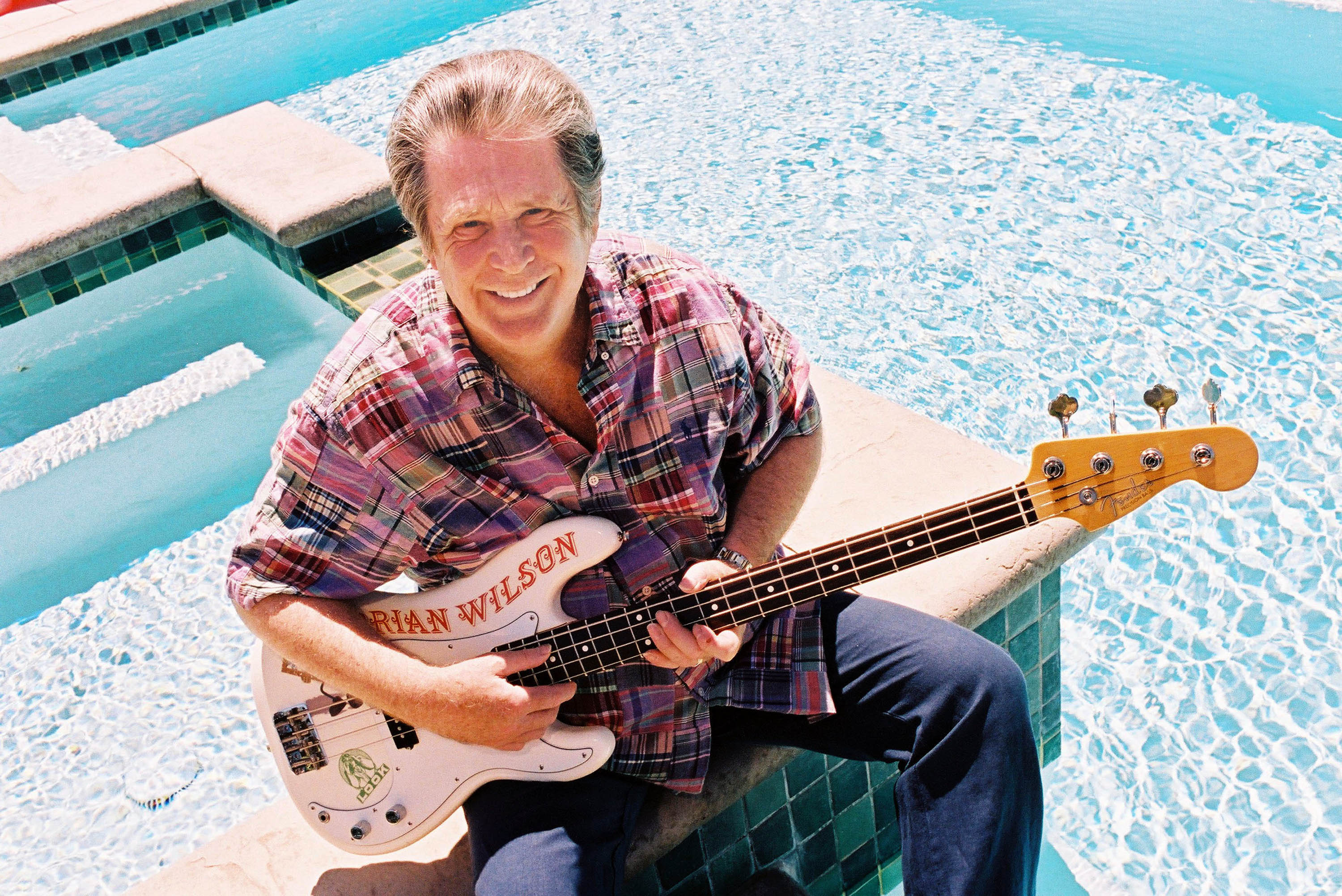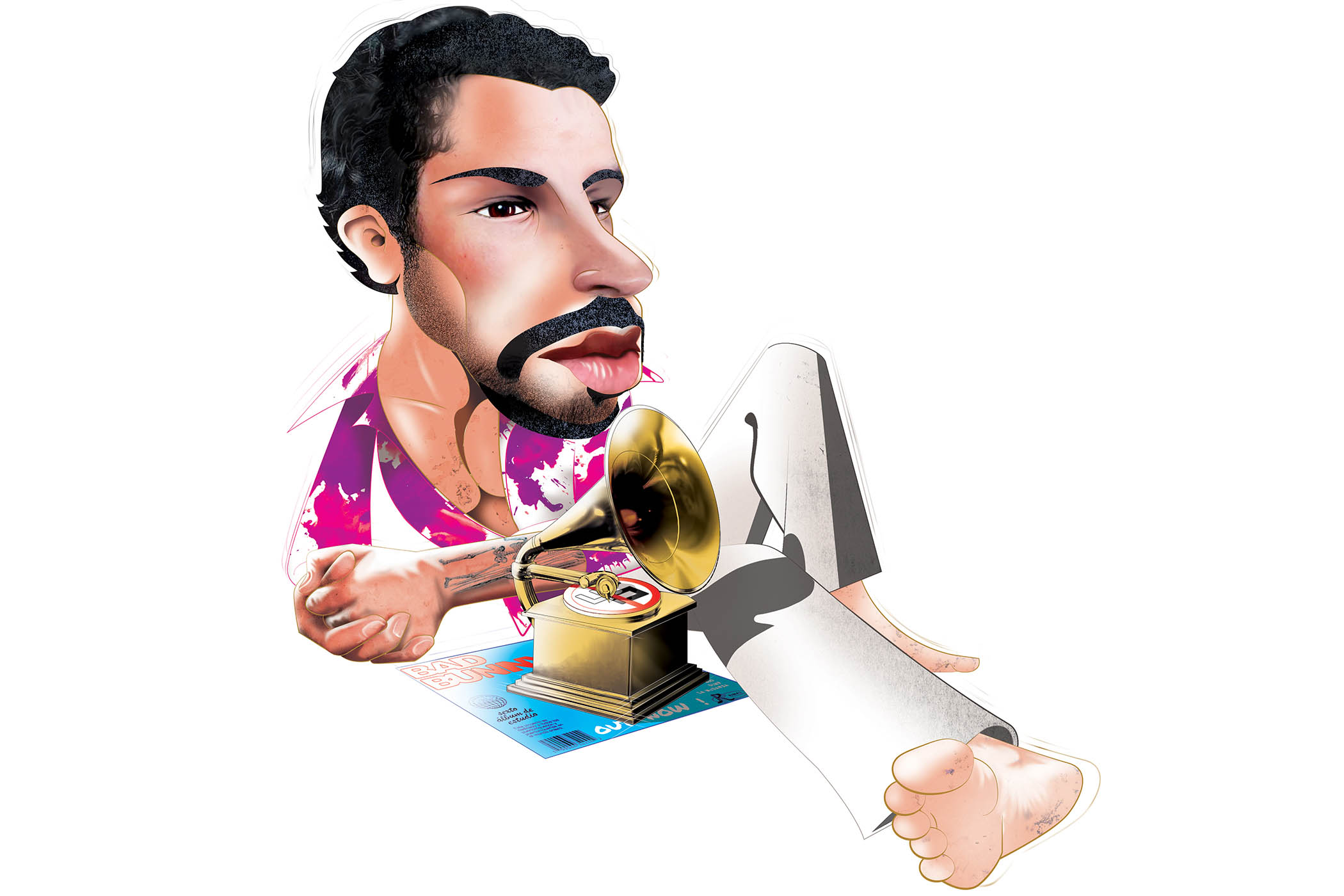The last image I saw of Brian Wilson alive was of him being led into a cinema to watch a screening of yet another documentary about the Beach Boys, the group he created and took to worldwide mega-success. I was watching it on YouTube, and the event was one of those plush Hollywood affairs. Wilson arrived in a wheelchair, pushed by minders. His face was entirely without expression. Some old friends waved at him, but they drew no response. He probably didn’t know where he was or who all these people were. He was off in his own private Joe Biden zone. I sensed he wouldn’t be long for this world. He was 82 and he’d accomplished enough and suffered enough. Let him rest.
So I was saddened but not surprised when the news came through of his death on Wednesday. The obituaries that have flooded forth have been mostly heartfelt, respectful and packed with relevant career and personal details: his birth in June 1942, his modest beginnings, growing up in Hawthorne, California, and the group he formed with his younger brothers Carl and Dennis, their cousin Mike Love and a friend from the neighbourhood when all were still teenagers. Brian was their composer and arranger, merging the close harmony style of 1950s vocal quartet the Four Freshmen with a gut-bucket rock rhythm à la Chuck Berry. Extraordinary success followed.
Wilson’s early back-story is full of remarkable achievements. He and his group first spearheaded the surf craze of the early 60s then briefly switched to car racing before blossoming into America’s most successful pop/rock act of the mid-60s. Only the Beatles rivalled them. It was a heady time.
Then something happened. As early as 1964, Wilson had experienced nervous breakdowns. A gawky, somewhat awkward youth, he simply wasn’t wired for the demands that big-time showbusiness placed on him. As a child, he had endured the cruelty and violence of his father Murry, an amateur songwriter. Wilson said of him: “He drank too much and became a monster – and he didn’t know how to deal with his son’s fears. Whenever I got afraid, he would yell at me or slap me.”
Refusing to tour with his group, Wilson continued recording with them while maintaining a fairly reclusive existence. For a while, this arrangement worked well. In 1965 he wrote and recorded California Girls, the Beach Boys’ biggest and most anthemic hit to date, and in 1966 he unleashed the album Pet Sounds as well as another masterpiece single, Good Vibrations. A follow-up album – supposedly to be released in 1967 and entitled Smile – was eagerly awaited by the taste-makers of the hour.
But Smile never materialised, and this is where the whole downslide in Wilson’s life comes into play. The Beach Boys still released albums but their old mentor seemed to recede into the background as the other members attempted to pick up the slack and steer the ship themselves. Every now and then, a photo might appear of an overweight, unshaven man looking a bit lost. That was pretty much the extent of Wilson’s public profile in the early 70s.
Drugs were often cited as the reason for Wilson’s dysfunctional decline during this era. Certainly his use of LSD in the mid-60s had a lasting, negative impact on his psyche. Drugs certainly exacerbated his problems. But they weren’t necessarily the cause. Something deeper and more mysterious was triggering his malaise.
This was partly why I moved to Los Angeles in 1975 — 50 years ago almost to the day — to do my own investigation into what had really happened to the man known as the Beach Boys’ “troubled genius”. I say “partly” because the main impetus driving me was that I’d been such a fan as an adolescent that I needed to know if the talent he once possessed was still there. Occasionally you’d get glimpses, but he couldn’t seem to follow an idea through. Co-workers who had tried to record with him in the 70s told me it was like dealing with a guy with an advanced case of attention deficit disorder.
Related articles:
Long story short, I first got to meet and interview Wilson for the NME five years later, in 1980. He was not in good shape. At first, he seemed an imposing figure. Well over 6ft tall with 300lb of weight and a shapeless beard, he looked like the kind of man parents warn their children about talking to. The house he was living in was a rental (he’d recently divorced) and the vibe in the living room where we both sat was both gloomy and somewhat surreal. Wilson was cogent when he spoke but something else was going on in his brainsphere. His body would frequently flinch involuntarily. Our interview lasted exactly half an hour. It ended abruptly when he jumped out of his seat, stammered an apology, explained he had to see his psychiatrist early the next day and rushed out of the room.
After that, through almost all of the 80s, the sorry saga of Wilson and his mental problems continued to evolve. There were the infamous Eugene Landy years when Wilson was placed under the strict supervision of a megalomaniac shrink best described by a co-worker as “just like Charles Manson only he hasn’t killed anyone yet”. (Wilson and Landy had worked together briefly in the late 70’s too.) At first, Wilson seemed to respond well to his new master. He lost a ton of weight and became more socially outgoing. But Landy gravely overstepped his role as Wilson’s caretaker and was attempting to control all aspects of his life, often to corrupt ends. He also prescribed Wilson medication that was later proven to be harmful to his fragile state of mind. During their time together, in 1987, Wilson released his first-ever solo album, a costly affair marred by Landy’s insistence that he and his girlfriend write most of the lyrics. It sold poorly and a second album was rejected by the record company.
Newsletters
Choose the newsletters you want to receive
View more
For information about how The Observer protects your data, read our Privacy Policy
In the 90s, though, things took an upward swing. Wilson’s in-laws went to court to successfully banish Landy from his life. He met and married his second wife, Melinda, who provided him with a much-needed emotional anchor. Slowly, as the decade progressed, one could note an ongoing improvement in Wilson’s social skills and musical ambitions.
Wilson was also blessed during that decade to find a backing group ideally suited to playing his often eccentrically arranged orchestrations. The players – known around their home base of LA as the Wondermints – were diehard fanboys who strove to replicate every sonic detail lurking in Wilson’s Beach Boy back catalogue. As they were still young-ish and bubbling with enthusiasm, they managed to rejuvenate the songs and provide Wilson with a musical comfort zone he could feel secure in.
A part of him never left high school. He was still the nerdy, misshapen kid who’d got picked on
A part of him never left high school. He was still the nerdy, misshapen kid who’d got picked on
Suddenly, you couldn’t get this guy off the stage. He and his group had performed everywhere by the decade’s end. Then they had the bright idea of performing the Pet Sounds album in its entirety, and some will argue that these performances mark the very high point of Wilson’s entire career. Others disagree. They prefer what came next: Wilson and his bandmates taking the broken shards of the aborted Smile project and crafting them into a finished whole.
It must have been around that period when I met him for the second and last time. His new recording of the Smile project was freshly available and he’d come to Paris, where I live, to promote it. He looked a lot better than at our last meeting. Yet I soon discovered that our interview was not going to be a fiery meeting of minds. The poor man was jetlagged and had already endured several hours of interrogation from foreign journalists. So his answers tended towards monosyllabic and he kept calling me “Steve”, which was disorientating. I forgave him. I was just glad to see him comfortable in his own skin for the first time in his adult life.
As we talked, another LA-based record maker who had scored big in the 60s was facing trial for murder. Phil Spector was all over the news, wearing ludicrous wigs and declaring his innocence. Wilson and Spector had history together. As a young man, Wilson had idolised Spector. But then they’d become rivals. At one point in the mid-60s, they were both hiring private detectives just to follow each other around.
“So do you think he did it?” I asked, but Wilson refused to even entertain the possibility of Spector being guilty. How could someone who made such beautiful music kill another human being? That was his rationale. To him, “Spector was still the greatest. Greater than the Beach Boys.” The fact that long ago he had transcended Spector as a music-making talent – that he’d taken Spector’s wall of sound and given it new vibrant detail and dimension – still seemed lost on him.
In his last 20 years Wilson was active for most of the time. He recorded and released several new albums. He even reunited the Beach Boys for an album and tour in 2012. He continued to perform with the Wondermints but his voice was becoming problematic. In June 2024, his wife Melinda died of cancer. Cut to the scene described at the beginning of this piece. And slowly fade.
How will he be remembered? As one of the greatest songwriters and composers of the late 20th century, rivalled in the 60s only by Lennon and McCartney and Burt Bacharach. As the man who pretty much invented the irresistible image of the California lifestyle and sold it to a world of envious teens. It’s somewhat eerie to see the once-carefree state that the Beach Boys promoted now engulfed in fire and smoke-bombs and pretty much under military law at the exact same moment that Wilson, its greatest musical ambassador, passes away.
Was he a genius? I think so, yes. The music he made between 1964 and 1966 is proof enough. Wilson was no trained musician. He was also deaf in one ear. How he could come up with such beautiful chord changes and harmonies, and such sophisticated arrangements, simply beggars belief.
What was he like in a one-on-one situation? Strange, harmless, gullible, whimsical, but fundamentally likable. A part of him had never left high school. He was still the nerdy, misshapen kid who’d got picked on, the lonely boy walking on the beach and yearning to encounter Miss Right.
That sense of post-adolescent longing is stamped all over his early work. Other pop singers in the early 60s were trying the same approach but invariably ended up sounding callow and wimpy. Wilson, by contrast, could elevate his lonely boy songs into a sonic stratosphere closer to high art.
Over the years, a number of diagnoses have been made public pertaining to Wilson’s mental equilibrium. “Paranoid schizophrenic” was one that stood up, if only to help explain his creative process better. At the peak of his powers, Wilson wrote from two distinct perspectives. One was celebratory, anthemic, uptempo and uplifting. The other was deeply melancholy and inward-searching yet strangely and sublimely cathartic.
It’s that catharsis that will keep his music alive for as long as there is music to hear.
That’s enough of me being the objective journalist. I haven’t heard a Wilson song since I was told he’d died. I’ll play some tonight. I never stopped being a fan. I started when I was an 11-year-old; now I’m 73. That’s when I’ll feel my eyes moisten and the waves of sorrow begin.
Yet it won’t last long because the music will raise my spirits again and keep me safe from gloom. It has always been that way. What a rare, remarkable gift he possessed. And what a frequently terrifying life he lived.
Nick Kent’s three favourites
The Warmth of the Sun
1964
Written with Mike Love, partly in reaction to the assassination of President John F Kennedy in November 1963, this is probably Wilson’s greatest lonely-boy-on-the-beach musical musing.
I Just Wasn’t Made for These Times
1966
This became the stand-out track of Pet Sounds from the first moment I heard the album. It still stands out today as Wilson’s most beautifully realised autobiographical outpouring.
Cabinessence
1969
Written with Van Dyke Parks in 1966 for the ill-fated Smile project, this astonishing piece of music — like Surf’s Up — is a tantalising example of Wilson’s seemingly limitless creative range then.
Nick Kent’s 1980 interview with Brian Wilson is in The Dark Stuff: Selected Writings on Rock Music 1972-1993, published by Faber
The Beach Boys pose for a portrait with some Honda mopeds in circa 1964. Clockwise from lower right: Dennis Wilson, Mike Love, Al Jardine, Carl Wilson, Brian Wilson. (Photo by Michael Ochs Archives/Getty Images)
Photograph by Marissa Roth/NYT


